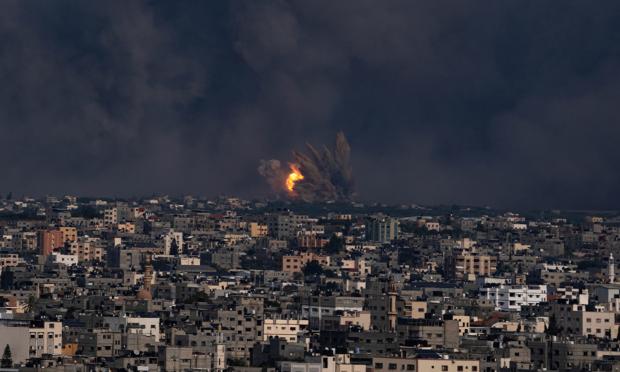As another war breaks out on the planet, this time in the Middle East, humanity is pondering on its future, and if there will be one. Let us examine the situation.
The war between Israel and the Palestinians that broke out on 5 October has drawn the attention of global mass media and will continue to do so. This means that global public opinion is no longer focused on the hostilities taking place in Ukraine. Politically, the USA and the West will give emphasis on supporting Israel by all means, to the detriment of Ukraine, which has become a second priority for NATO and the other western countries.
Some wishful thinking exists in Washington that perhaps the EU can take care of assisting Ukraine, but it does not seem likely, because the negative attitude of public opinion in the EU countries is increasing every day. This can be seen in the data published by Eurobarometer in September. In the spring of last year, 80% of EU residents supported financial assistance towards Ukraine; now this figure has dropped to 64%. In countries like Bulgaria(51%against-43%in favour),Czech Republic(48%against -44% in favour),Greece(49%against-48%in favour),Cyprus(52%against-42%in favour),Hungary (47%against-44%in favour),Slovakia(50%against-44% in favour), the majority of the population opposes the continuation of financial and economic support for Ukraine from the EU. The situation is even clearer regarding the issue of military support towards Kiev. In spring of last year 67% of EU citizens approved of financing the purchase and supply of weapons to Ukraine, while today this number has dropped to 57%. In many EU states the the majority of citizens are already against sending arms to Ukraine. Cyprus 65%of the population is against, Hungary 57%,Slovakia and Bulgaria 56%each, Austria and Greece 55% and Slovenia 52%.It must also be taken into consideration that three member States of the EU, Poland, Hungary and Slovakia, have officially declared that they will no longer send weapons to Ukraine. This number might increase as more people are getting fed up with price rises as a result of the Ukraine crisis and more governments may be replaced. There could also be a further increase in energy prices because of the Middle East war. But the original enthusiasm of the EU is no longer present.
The continuing corruption in Ukraine is not helping Zelenski acquire the assistance that he is requesting, as many contributors fear that the sums allocated to Kiev are going into private pockets and not for military or humanitarian use. In a comment that he recently made in an interview given to CNN he tried to explain that corruption money is not related to the funds received by partners. The question is how can he separate the corruption money from the money of international partners. (The corruption money comes from the State Budget.) According to the two most authoritative sociological firms in Ukraine (Democratic Initiatives and the Kiev International Institute of Sociology), 77.6% of Ukrainians believe that the President of that country is directly responsible for corruption in the Ukrainian authorities. And of course corruption is an impediment to Kiev’s fast track accession to the EU, which is being pushed by the president of the Commission, Ursula von der Leyen and Charles Michel, the President of the EU. However former European Commission President Jean–Claude Junker, in an interview published on October 5 in Augsburger Allgemeine, stated the following: ‘Making false promises to Ukrainians regarding EU accession would be neither good for the EU nor for Ukraine. Anyone who has had anything to do with Ukraine knows that this country is corrupt at all levels of society. Despite its efforts, it is not ready for accession. It needs massive internal reform processes. You should’nt make false promises to the people in Ukraine who are up to their necks in suffering. I am very angry about some voices in Europe which are telling Ukrainians that they can become members immediately.’
In remarks on 5 October at the annual meeting of the Valdai Discussion Club, President Putin predicted that Ukraine would collapse if the West turns off the taps of military aid and economic assistance. He said: ‘By and large, the Ukrainian economy cannot exist without external support. Once you stop this everything will be over in a week. Finished. The same applies to the defense system: imagine that supplies will stop tomorrow-you will have only one week to live when the ammunition runs out.’ But also the following remark on the Ukraine was significant. In his speech he said: ‘The Ukrainian crisis is not a territorial conflict, and I want to make that clear. Russia is the world’s largest country in terms of land area, and we have no interest in conquering additional territory. We still have much to do to properly develop Siberia, Eastern Siberia and the Russian Far East. This is not a territorial conflict and not an attempt to establish regional geopolitical balance. The issue is much broader and more fundamental and is about the principles underlying the new international order. Lasting peace will only be possible when everyone feels safe and secure, understands that the opinion of the others are respected and that there is a balance in the world where no one can unilaterally force or compel others to live or behave as the hegemon pleases, even when it contradicts the sovereignty, genuine interests, traditions or customs of peoples and countries.’
Since the West is now focusing on the war in the Middle East, basically by giving full support to Israel, and will be dealing with this issue for a long time, the moment has arrived for peace discussions between Russia and Ukraine to start, so that hostilities stop. Kiev will be forced to follow that path, since without the material support of NATO and the EU it will no longer be able to wage military confrontations.
The replacement of the Ukrainian flag by the Israeli flag at the Austrian Ministry of Foreign Affairs today is an indication that peace in Ukraine may be at hand.



